View in other NatureServe Network Field Guides
NatureServe
Montana
Utah
Wyoming
Idaho
Wisconsin
British Columbia
South Carolina
Yukon
California
New York
Bushy-tailed Woodrat - Neotoma cinerea
Other Names:
Pack Rat
Native Species
Global Rank:
G5
State Rank:
S5
(see State Rank Reason below)
Agency Status
USFWS:
USFS:
BLM:
External Links
State Rank Reason (see State Rank above)
Species is relatively common within suitable habitat and widely distributed across portions of the state
General Description
The Bushy-tailed Woodrat (the legendary pack rat of western stories) grows to approximately 15 inches and 11 ounces in Montana. Together with its flat, squirrel-like tail, long full whiskers, large hairless ears, protruding eyes, and its size make it easy to recognize. Its coloring is lead gray on the back and outside and white, pinkish or buff on the feet, ears, and belly (Foresman 2012). It may also have black or dark brown hairs on the back, giving it a darker appearance. Juveniles can have blue-gray fur on top (Kritzman 1977).
Species Range
Montana Range
Range Descriptions
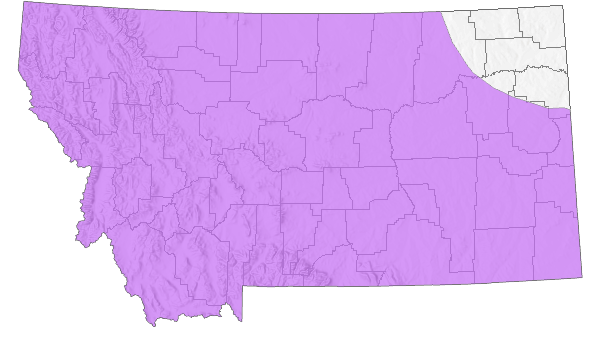
 Native
Native
Western Hemisphere Range

Observations in Montana Natural Heritage Program Database
Number of Observations: 629
(Click on the following maps and charts to see full sized version)
Map Help and Descriptions
Relative Density
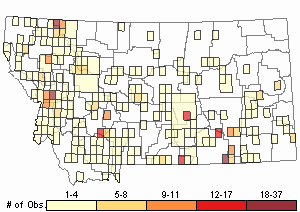
Recency
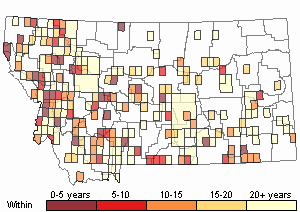

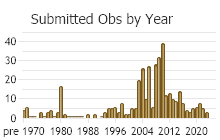
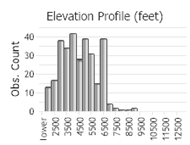 (Observations spanning multiple months or years are excluded from time charts)
(Observations spanning multiple months or years are excluded from time charts)
Migration
Non-migratory.
Habitat
Occurs in crevices where there are large amounts of sticks, leaves & other debris used to build nest. Rockslides, rocky slopes, abandoned homesites, badlands. Occasionally lodges nest in tree forks high above ground (Hoffmann and Pattie 1968, Adelman 1979, Dood 1980).
National Vegetation Classification System Groups Associated with this Species
Alpine
Alpine - Sparse and Barren
Alpine - Vegetated
Forest and Woodland
Deciduous Forest and Woodland
Low Elevation - Xeric Forest and Woodland
Montane - Subalpine Forest and Woodland
Shrubland
Arid - Saline Shrubland
Foothills - Montane Shrubland
Sagebrush Shrubland
Grassland
Lowland - Prairie Grassland
Montane - Subalpine Grassland
Sparse and Barren
Sparse and Barren
Wetland and Riparian
Riparian and Wetland Forest
Riparian Shrubland
Recently Disturbed or Modified
Harvested Forest
Insect-Killed Forest
Introduced Vegetation
Human Land Use
Agriculture
Developed
Food Habits
Evidently not extremely selective in its diet of foliage, fruits and seeds of shrubs & forbs, conifer & fungi. Stores food for winter consumption (vegetation) (Jones et al. 1983).
Ecology
A noisly pest in cabins sometimes - rummages around pilfering small items. May drop an item to take a desirable item. Builds nest of sticks, bones, etc. (Jones et al. 1983).
Reproductive Characteristics
MT breeding season not known. May span the warmer months, or may be more restricted. In northern latitudes possibly only 1 litter produced/year (Jones et al. 1983).
Stewardship Responsibility
References
- Literature Cited AboveLegend:
 View Online Publication
View Online Publication Adelman, E.B. 1979. A survey of the nongame mammals in the Upper Rattlesnake Creek drainage of western Montana. M.S. thesis. University of Montana, Missoula. 129 pp.
Adelman, E.B. 1979. A survey of the nongame mammals in the Upper Rattlesnake Creek drainage of western Montana. M.S. thesis. University of Montana, Missoula. 129 pp. Dood, A.R. 1980. Terry Badlands nongame survey and inventory final report. Montana Department of Fish, Wildlife, and Parks and Bureau of Land Management, Helena, MT. 70 pp.
Dood, A.R. 1980. Terry Badlands nongame survey and inventory final report. Montana Department of Fish, Wildlife, and Parks and Bureau of Land Management, Helena, MT. 70 pp. Foresman, K.R. 2012. Mammals of Montana. Second edition. Mountain Press Publishing, Missoula, Montana. 429 pp.
Foresman, K.R. 2012. Mammals of Montana. Second edition. Mountain Press Publishing, Missoula, Montana. 429 pp. Hoffmann, R.S. and D.L. Pattie. 1968. A guide to Montana mammals: identification, habitat, distribution, and abundance. Missoula, MT: University of Montana. 133 p.
Hoffmann, R.S. and D.L. Pattie. 1968. A guide to Montana mammals: identification, habitat, distribution, and abundance. Missoula, MT: University of Montana. 133 p. Jones, J.K., D.M. Armstrong, R.S. Hoffmann and C. Jones. 1983. Mammals of the northern Great Plains. University of Nebraska Press, Lincoln. 379 pp.
Jones, J.K., D.M. Armstrong, R.S. Hoffmann and C. Jones. 1983. Mammals of the northern Great Plains. University of Nebraska Press, Lincoln. 379 pp. Kritzman, E.B. 1977. Little mammals of the Pacific Northwest. Pacific Search Press, Seattle, WA.
Kritzman, E.B. 1977. Little mammals of the Pacific Northwest. Pacific Search Press, Seattle, WA.
- Additional ReferencesLegend:
 View Online Publication
View Online Publication
Do you know of a citation we're missing? [PRESI] Powder River Eagle Studies Incorporated. 1998b. Spring Creek Mine 1997 wildlife monitoring studies. Powder River Eagle Studies Incorporated. Gillete, WY.
[PRESI] Powder River Eagle Studies Incorporated. 1998b. Spring Creek Mine 1997 wildlife monitoring studies. Powder River Eagle Studies Incorporated. Gillete, WY. Allen, K.L., T. Weaver, and D. Flath. 1994. Small mammals in Northern Rocky Mountain ecosystems. Unpubl. report to Bureau of Land Management and United States Forest Service, August 31, 1994. Montana State Univ., Bozeman. 54 pp.
Allen, K.L., T. Weaver, and D. Flath. 1994. Small mammals in Northern Rocky Mountain ecosystems. Unpubl. report to Bureau of Land Management and United States Forest Service, August 31, 1994. Montana State Univ., Bozeman. 54 pp. American Gem Corporations. 1996. Application for an Operating Permit and Proposed Plan of Operations: Gem Mountain Sapphire Mine, Granite County, Montana. August 1996
American Gem Corporations. 1996. Application for an Operating Permit and Proposed Plan of Operations: Gem Mountain Sapphire Mine, Granite County, Montana. August 1996 Anaconda Minerals Company, and Camp, Dresser & McKee. 1981. Anaconda Stillwater Project 6-month environmental baseline report. CDM Project No. 3139. Vol. I Appendix. Jan. 15, 1981.
Anaconda Minerals Company, and Camp, Dresser & McKee. 1981. Anaconda Stillwater Project 6-month environmental baseline report. CDM Project No. 3139. Vol. I Appendix. Jan. 15, 1981. Buck, C.L. 1939. Pattern correlation of mammalian teeth as a means of identification. M.Sc. Thesis. Bozeman, Montana: Montana State University. 55 p.
Buck, C.L. 1939. Pattern correlation of mammalian teeth as a means of identification. M.Sc. Thesis. Bozeman, Montana: Montana State University. 55 p. Butts, T.W., Western Technology and R.L. Eng. 1993. Continental Lime Indian Creek Mine, Townsend, MT. Life of Mine Wildlife Reconnaissance. In Life-of-Mine Amendment. Continental Lime, Inc., Indian Creek Mine & Plant. Vol. 2. October 13, 1992.
Butts, T.W., Western Technology and R.L. Eng. 1993. Continental Lime Indian Creek Mine, Townsend, MT. Life of Mine Wildlife Reconnaissance. In Life-of-Mine Amendment. Continental Lime, Inc., Indian Creek Mine & Plant. Vol. 2. October 13, 1992. Carey, A. B. 1991. The biology of arboreal rodents in Douglas-fir forests. USDA, Forest Service, Gen.Tech.Rep. PNW-276.
Carey, A. B. 1991. The biology of arboreal rodents in Douglas-fir forests. USDA, Forest Service, Gen.Tech.Rep. PNW-276. Clark, S.G. and M.R. Stromberg. 1987. Mammals in Wyoming. University of Kansas Museum of Natural History, Public Education Series Number 10. xii + 314 pp.
Clark, S.G. and M.R. Stromberg. 1987. Mammals in Wyoming. University of Kansas Museum of Natural History, Public Education Series Number 10. xii + 314 pp. Connolly-Newman, Hayley R. 2013. Effect of cover on small mammal abundance and movement through wildlife underpasses. M.S. Thesis. University of Montana. Missoula, MT.
Connolly-Newman, Hayley R. 2013. Effect of cover on small mammal abundance and movement through wildlife underpasses. M.S. Thesis. University of Montana. Missoula, MT. Corbett, J. 2011. Evaluation and management of select natural cave and abandoned mine features of the Lewis & Clark and Helena National Forests, Montana. Bat Conservation International. 18pp plus appendices.
Corbett, J. 2011. Evaluation and management of select natural cave and abandoned mine features of the Lewis & Clark and Helena National Forests, Montana. Bat Conservation International. 18pp plus appendices. Craighead, A.C. 2000. Pellet and scat analysis as indicators of present and past habitats. M.Sc. Theses. Bozeman, MT: Montana State University. 219 p.
Craighead, A.C. 2000. Pellet and scat analysis as indicators of present and past habitats. M.Sc. Theses. Bozeman, MT: Montana State University. 219 p. Cramer, P.C. 1992. Small mammal diversity and abundance in Douglas Fir old growth forests. M.Sc. Thesis. Bozeman, MT: Montana State University. 64 p.
Cramer, P.C. 1992. Small mammal diversity and abundance in Douglas Fir old growth forests. M.Sc. Thesis. Bozeman, MT: Montana State University. 64 p. Elliott, Joe C. and Hydrometrics, Inc., Helena, MT., 1994, Supplement to wildlife baseline investigation life-of-mine expansion plan: Regal Mine, Barretts Minerals, Inc., Madison County, Montana. August 2000. In Life-of Mine Expansion Plan: Barretts Minerals, Inc., Regal Mine, Madison County, Montana. Vol. 2. App. C: Baseline Wildlife Reconnaissance. December 1999.
Elliott, Joe C. and Hydrometrics, Inc., Helena, MT., 1994, Supplement to wildlife baseline investigation life-of-mine expansion plan: Regal Mine, Barretts Minerals, Inc., Madison County, Montana. August 2000. In Life-of Mine Expansion Plan: Barretts Minerals, Inc., Regal Mine, Madison County, Montana. Vol. 2. App. C: Baseline Wildlife Reconnaissance. December 1999. Eng, R.L. 1976. Wildlife Baseline Study [for West Fork of the Stillwater and Picket Pin drainages]
Eng, R.L. 1976. Wildlife Baseline Study [for West Fork of the Stillwater and Picket Pin drainages] Escherich, P.C. 1981. Social biology of the bushy-tailed woodrat, Neotoma cinerea. University of California Publications in Zoology 110: xiv + 132 pp.
Escherich, P.C. 1981. Social biology of the bushy-tailed woodrat, Neotoma cinerea. University of California Publications in Zoology 110: xiv + 132 pp. Farmer, Patrick J., and Thomas W. Butts, Western Technology & Eng., Inc., Helena, MT., 1994, McDonald Project Terrestrial Wildlife Study, November 1989 - November 1993. April 1994. In McDonald Gold Project: Wildlife & Fisheries. [#18]. Seven-up Pete Joint Venture, Lincoln, MT. Unpub. No date.
Farmer, Patrick J., and Thomas W. Butts, Western Technology & Eng., Inc., Helena, MT., 1994, McDonald Project Terrestrial Wildlife Study, November 1989 - November 1993. April 1994. In McDonald Gold Project: Wildlife & Fisheries. [#18]. Seven-up Pete Joint Venture, Lincoln, MT. Unpub. No date. Finley, R.B., Jr. 1958. The wood rats of Colorado: distribution and ecology. Univ. Kansas Publ. Mus. Nat. Hist., 10:213-552.
Finley, R.B., Jr. 1958. The wood rats of Colorado: distribution and ecology. Univ. Kansas Publ. Mus. Nat. Hist., 10:213-552. Fjell, Alan K., 1986, Peabody Coal Company Big Sky Mine, Rosebud County, MT. Wildlife monitoring report: 1985 field season. March 1986.
Fjell, Alan K., 1986, Peabody Coal Company Big Sky Mine, Rosebud County, MT. Wildlife monitoring report: 1985 field season. March 1986. Fjell, Alan K., and Brian R. Mahan, compilers., 1984, Peabody Coal Company Big Sky Mine, Rosebud County, MT. Wildlife monitoring report: 1983 field season. February 1984.
Fjell, Alan K., and Brian R. Mahan, compilers., 1984, Peabody Coal Company Big Sky Mine, Rosebud County, MT. Wildlife monitoring report: 1983 field season. February 1984. Fjell, Alan K., and Brian R. Mahan., 1983, Peabody Coal Company Big Sky Mine, Rosebud County, MT. Wildlife monitoring report: 1982 field season. May 1983.
Fjell, Alan K., and Brian R. Mahan., 1983, Peabody Coal Company Big Sky Mine, Rosebud County, MT. Wildlife monitoring report: 1982 field season. May 1983. Fjell, Alan K., and Brian R. Mahan., 1985, Peabody Coal Company Big Sky Mine, Rosebud County, MT. Wildlife monitoring report: 1984 field season. February 1985.
Fjell, Alan K., and Brian R. Mahan., 1985, Peabody Coal Company Big Sky Mine, Rosebud County, MT. Wildlife monitoring report: 1984 field season. February 1985. Fjell, Alan K., and Brian R. Mahan., 1987, Big Sky Mine, Rosebud County, MT. Wildlife monitoring report: 1986 field season. April 1987.
Fjell, Alan K., and Brian R. Mahan., 1987, Big Sky Mine, Rosebud County, MT. Wildlife monitoring report: 1986 field season. April 1987. Foresman, K.R. 2001. The wild mammals of Montana. American Society of Mammalogists, Special Publication Number 12. Lawrence, KS. 278 pp.
Foresman, K.R. 2001. The wild mammals of Montana. American Society of Mammalogists, Special Publication Number 12. Lawrence, KS. 278 pp. Geppert, T. J. 1984. Small mammals of the Shield Trap, East Pryor Mountain, Montana. M.S. thesis. University of Iowa, Iowa City. 45 pp.
Geppert, T. J. 1984. Small mammals of the Shield Trap, East Pryor Mountain, Montana. M.S. thesis. University of Iowa, Iowa City. 45 pp. Grayson, D.K. and S.D. Livingston. 1989. High-elevation records for Neotoma cinerea in the White Mountains, California. Great Basin Naturalist. 49:392-395.
Grayson, D.K. and S.D. Livingston. 1989. High-elevation records for Neotoma cinerea in the White Mountains, California. Great Basin Naturalist. 49:392-395. Halvoison, C. H. 1982. Rodent occurrence, habitat disturbance and seed fall in a larch-fir forest. Ecology 63(2):423-433.
Halvoison, C. H. 1982. Rodent occurrence, habitat disturbance and seed fall in a larch-fir forest. Ecology 63(2):423-433. Hanauska-Brown, L., B.A. Maxell, A. Petersen, and S. Story. 2014. Diversity Monitoring in Montana 2008-2010 Final Report. Montana Fish, Wildlife & Parks. Helena, MT. 78 pp.
Hanauska-Brown, L., B.A. Maxell, A. Petersen, and S. Story. 2014. Diversity Monitoring in Montana 2008-2010 Final Report. Montana Fish, Wildlife & Parks. Helena, MT. 78 pp. Harmata, A.R. 1991. Impacts of oil and gas development on raptors associated with Kevin Rim, Montana. Bozeman, MT: Montana State University. Unpublished report by the Kevin Rim Raptor Study Group. Prepared for the USDI BLM, Great Falls Resource Area, Great Falls, MT. 106 p.
Harmata, A.R. 1991. Impacts of oil and gas development on raptors associated with Kevin Rim, Montana. Bozeman, MT: Montana State University. Unpublished report by the Kevin Rim Raptor Study Group. Prepared for the USDI BLM, Great Falls Resource Area, Great Falls, MT. 106 p. Holmes, Brian. 2003. Ecology and Persistence of Sylvatic Plague in Phillips County, Montana. MS Thesis. University of Montana, Missoula, MT.
Holmes, Brian. 2003. Ecology and Persistence of Sylvatic Plague in Phillips County, Montana. MS Thesis. University of Montana, Missoula, MT. Humphris, Michael., 1990, Wildlife Monitoring Report. Spring Creek Coal Company 1990 Mining Annual Report. Appendix I. April 11, 1990.
Humphris, Michael., 1990, Wildlife Monitoring Report. Spring Creek Coal Company 1990 Mining Annual Report. Appendix I. April 11, 1990. Humphris, Michael., 1993, Wildlife Monitoring Report. Spring Creek Coal Company 1993 Mining Annual Report. Appendix I. April 11, 1993.
Humphris, Michael., 1993, Wildlife Monitoring Report. Spring Creek Coal Company 1993 Mining Annual Report. Appendix I. April 11, 1993. Humphris, Michael., 1994, Wildlife Monitoring Report. Spring Creek Coal Company 1994 Mining Annual Report. Appendix I. April 1994.
Humphris, Michael., 1994, Wildlife Monitoring Report. Spring Creek Coal Company 1994 Mining Annual Report. Appendix I. April 1994. Johnson, L.J. 1960. Mammal studies on the Lubrecht Forest, Montana: a preliminary report. Proc. Mont. Acad. Sci. 20: 40-47.
Johnson, L.J. 1960. Mammal studies on the Lubrecht Forest, Montana: a preliminary report. Proc. Mont. Acad. Sci. 20: 40-47. Johnson, M.K. and R.M. Hansen. 1979. Foods of cottontails and woodrats in southcentral Idaho. Journal of Mammalogy. 60(1): 213-215.
Johnson, M.K. and R.M. Hansen. 1979. Foods of cottontails and woodrats in southcentral Idaho. Journal of Mammalogy. 60(1): 213-215. Joslin, Gayle, and Heidi B. Youmans. 1999. Effects of recreation on Rocky Mountain wildlife: a review for Montana. [Montana]: Montana Chapter of the Wildlife Society.
Joslin, Gayle, and Heidi B. Youmans. 1999. Effects of recreation on Rocky Mountain wildlife: a review for Montana. [Montana]: Montana Chapter of the Wildlife Society. Kelsall, J. P., Oct.-Dec. 1971, A Range Extension for the Bushy-tailed Wood Rat
Kelsall, J. P., Oct.-Dec. 1971, A Range Extension for the Bushy-tailed Wood Rat Lampe, R.P., J.K. Jones Jr., R.S. Hoffmann, and E.C. Birney. 1974. The mammals of Carter County, southeastern Montana. Occa. Pap. Mus. Nat. Hist. Univ. Kan. 25:1-39.
Lampe, R.P., J.K. Jones Jr., R.S. Hoffmann, and E.C. Birney. 1974. The mammals of Carter County, southeastern Montana. Occa. Pap. Mus. Nat. Hist. Univ. Kan. 25:1-39. Martin, P.R., K. Dubois and H.B. Youmans. 1981. Terrestrial wildlife inventory in selected coal areas, Powder River resources area final report. Montana Department of Fish, Wildlife and Parks and Bureau of Land Management, Helena, MT. No. YA-553-CTO- 24. 288 p.
Martin, P.R., K. Dubois and H.B. Youmans. 1981. Terrestrial wildlife inventory in selected coal areas, Powder River resources area final report. Montana Department of Fish, Wildlife and Parks and Bureau of Land Management, Helena, MT. No. YA-553-CTO- 24. 288 p. Martin, Steve A., ECON, Inc., Helena, MT., 1982, Flathead Project Wildlife Report, 1981-1982. November 30, 1982.
Martin, Steve A., ECON, Inc., Helena, MT., 1982, Flathead Project Wildlife Report, 1981-1982. November 30, 1982. Matthews, W.L. 1981. Broadus-Pumpkin Creek baseline inventory - wildlife. Bureau of Land Management, Miles City, MT. 83 p.
Matthews, W.L. 1981. Broadus-Pumpkin Creek baseline inventory - wildlife. Bureau of Land Management, Miles City, MT. 83 p. Montana Dept. of State Lands. U.S. Office of Surface Mining., 1985, Draft Environmental Impact Statement. Consolidation Coal Company. CX Ranch Mine, Big Horn County, Montana.
Montana Dept. of State Lands. U.S. Office of Surface Mining., 1985, Draft Environmental Impact Statement. Consolidation Coal Company. CX Ranch Mine, Big Horn County, Montana. Morrison-Maierle Env. Corp., Helena, MT., 1993, Biological assessment and wildlife reconnaissance, Holnam Cement Plant, Trident, Montana. In Application to Amend Operating Permit 00004 for Trident Quarries, Three Forks, Montana. Exhibit DD: Wildlife Reconnaisance Study. June 28, 1996.
Morrison-Maierle Env. Corp., Helena, MT., 1993, Biological assessment and wildlife reconnaissance, Holnam Cement Plant, Trident, Montana. In Application to Amend Operating Permit 00004 for Trident Quarries, Three Forks, Montana. Exhibit DD: Wildlife Reconnaisance Study. June 28, 1996. Negus, N.C. 1950. Fluctuation in the population of Neotoma cinerea (woodrat) in Jackson Hole, Wyoming. Journal of Mammalogy 31:196.
Negus, N.C. 1950. Fluctuation in the population of Neotoma cinerea (woodrat) in Jackson Hole, Wyoming. Journal of Mammalogy 31:196. Oechsli, L.M. 2000. Ex-urban development in the Rocky Mountain West: consequences for native vegetation, wildlife diversity, and land-use planning in Big Sky, Montana. M.Sc. Thesis. Montana State University, Bozeman. 73 p.
Oechsli, L.M. 2000. Ex-urban development in the Rocky Mountain West: consequences for native vegetation, wildlife diversity, and land-use planning in Big Sky, Montana. M.Sc. Thesis. Montana State University, Bozeman. 73 p. Pattie, D.L. and N.A. M. Verbeek. 1967. Alpine mammals of the Beartooth Plateau. Northwest Science 41(3): 110-117.
Pattie, D.L. and N.A. M. Verbeek. 1967. Alpine mammals of the Beartooth Plateau. Northwest Science 41(3): 110-117. Powder River Eagle Studies, Inc., Gillette, WY., 1996, Spring Creek Mine 1995 Wildlife Monitoring Studies. Spring Creek Coal Company 1995-1996 Mining Annual Report. Vol. I, App. I. May 1996.
Powder River Eagle Studies, Inc., Gillette, WY., 1996, Spring Creek Mine 1995 Wildlife Monitoring Studies. Spring Creek Coal Company 1995-1996 Mining Annual Report. Vol. I, App. I. May 1996. Powder River Eagle Studies, Inc., Gillette, WY., 1997, Spring Creek Mine 1996 Wildlife Monitoring Studies. February 1997.
Powder River Eagle Studies, Inc., Gillette, WY., 1997, Spring Creek Mine 1996 Wildlife Monitoring Studies. February 1997. Powder River Eagle Studies, Inc., Gillette, WY., 1999, Spring Creek Mine 1998 Wildlife Monitoring. March 1999.
Powder River Eagle Studies, Inc., Gillette, WY., 1999, Spring Creek Mine 1998 Wildlife Monitoring. March 1999. Reichel, J.D. 1986. Habitat use by alpine mammals in the Pacific Northwest. Arctic and Alpine Research. 18(1): 111-119.
Reichel, J.D. 1986. Habitat use by alpine mammals in the Pacific Northwest. Arctic and Alpine Research. 18(1): 111-119. Reichel, J.D. and S.G. Beckstrom. 1993. Northern bog lemming survey: 1992. Unpublished report. Montana Natural Heritage Program, Helena, MT. 64 p.
Reichel, J.D. and S.G. Beckstrom. 1993. Northern bog lemming survey: 1992. Unpublished report. Montana Natural Heritage Program, Helena, MT. 64 p. Reichel, J.D. and S.G. Beckstrom. 1994. Northern bog lemming survey: 1993. Unpublished report. Montana Natural Heritage Program. Helena, MT. 87 pp.
Reichel, J.D. and S.G. Beckstrom. 1994. Northern bog lemming survey: 1993. Unpublished report. Montana Natural Heritage Program. Helena, MT. 87 pp. Reid, F. 2006. Peterson Field Guide to Mammals of North America, 4th Edition. Houghton Mifflin Company: Boston and New York, 608 pp.
Reid, F. 2006. Peterson Field Guide to Mammals of North America, 4th Edition. Houghton Mifflin Company: Boston and New York, 608 pp. Rust, H. J. 1946. Mammals of northern Idaho. J. Mammal. 27(4): 308-327.
Rust, H. J. 1946. Mammals of northern Idaho. J. Mammal. 27(4): 308-327. Sawyer, H. E. 1935. Studies on the rodents of Montana. M.A. thesis. University of Montana, Missoula. 111 pp.
Sawyer, H. E. 1935. Studies on the rodents of Montana. M.A. thesis. University of Montana, Missoula. 111 pp. Schwab, Nathan. 2003. Mine Assessments for Bat Activity on Lands Managed by the BLM, Missoula Field Office 2003. Report to USDI BLM Missoula FO. Missoula, MT. 10pp.
Schwab, Nathan. 2003. Mine Assessments for Bat Activity on Lands Managed by the BLM, Missoula Field Office 2003. Report to USDI BLM Missoula FO. Missoula, MT. 10pp. Schwab, Nathan. 2004. Mine Assessment for Bat Activity on Lands Managed by the BLM, Missoula Field Office 2004. USDI BLM Missoula FO. Missoula, MT. 16 pp.
Schwab, Nathan. 2004. Mine Assessment for Bat Activity on Lands Managed by the BLM, Missoula Field Office 2004. USDI BLM Missoula FO. Missoula, MT. 16 pp. Scow, K.L. 1981. Ecological distribution of small mammals at Sarpy Creek, Montana, with special consideration of the Deer Mouse, Peromyscus maniculatus. M.Sc. Thesis. Bozeman, Montana: Montana State University. 73 p.
Scow, K.L. 1981. Ecological distribution of small mammals at Sarpy Creek, Montana, with special consideration of the Deer Mouse, Peromyscus maniculatus. M.Sc. Thesis. Bozeman, Montana: Montana State University. 73 p. Smith, F. A. 1997. Neotoma cinerea. American Society of Mammalogists, Lawrence, KS. Mammalian Species No. 564:1-8.
Smith, F. A. 1997. Neotoma cinerea. American Society of Mammalogists, Lawrence, KS. Mammalian Species No. 564:1-8. Spring Creek Coal Company., 1992, Wildlife Monitoring Report. Spring Creek Coal Company 1992 Mining Annual Report. Appendix I.
Spring Creek Coal Company., 1992, Wildlife Monitoring Report. Spring Creek Coal Company 1992 Mining Annual Report. Appendix I. Thompson, L.S. 1982. Distribution of Montana amphibians, reptiles, and mammals. Bozeman: Montana Audubon Council. 24 pp.
Thompson, L.S. 1982. Distribution of Montana amphibians, reptiles, and mammals. Bozeman: Montana Audubon Council. 24 pp. Thompson, Richard W., Western Resource Dev. Corp., Boulder, CO., 1996, Wildlife baseline report for the Montana [Montanore] Project, Lincoln and Sanders counties, Montana. In Application for a Hard Rock Operating Permit and Proposed Plan of Operation, Montanore Project, Lincoln and Sanders Counties, Montana. Vol. 5. Stroiazzo, John. Noranda Minerals Corp., Libby, MT. Revised September 1996.
Thompson, Richard W., Western Resource Dev. Corp., Boulder, CO., 1996, Wildlife baseline report for the Montana [Montanore] Project, Lincoln and Sanders counties, Montana. In Application for a Hard Rock Operating Permit and Proposed Plan of Operation, Montanore Project, Lincoln and Sanders Counties, Montana. Vol. 5. Stroiazzo, John. Noranda Minerals Corp., Libby, MT. Revised September 1996. Tweten, R.G. 1984. Baseline survey of furbearing mammals within the South Fork drainage Sun River, Montana. M.Sc. Thesis. Bozeman, MT: Montana State University. 63 p.
Tweten, R.G. 1984. Baseline survey of furbearing mammals within the South Fork drainage Sun River, Montana. M.Sc. Thesis. Bozeman, MT: Montana State University. 63 p. Van Horn, R.C. 1993. Ferruginous Hawk and Prairie Falcon reproductive and behavioral responses to human activity near the Kevin Rim, Montana. M.Sc. Thesis. Bozeman, Montana: Montana State University. 86 p.
Van Horn, R.C. 1993. Ferruginous Hawk and Prairie Falcon reproductive and behavioral responses to human activity near the Kevin Rim, Montana. M.Sc. Thesis. Bozeman, Montana: Montana State University. 86 p. Waage, B.C. 1988. Western Energy Company Rosebud Mine, Colstrip, Montana: Annual Wildlife Monitoring Report, 1988 Field Season. December 1988.
Waage, B.C. 1988. Western Energy Company Rosebud Mine, Colstrip, Montana: Annual Wildlife Monitoring Report, 1988 Field Season. December 1988. Waage, Bruce C., 1992, Western Energy Company Rosebud Mine, Colstrip, Montana: Annual Wildlife Monitoring Report, 1991 Field Season. December 1992.
Waage, Bruce C., 1992, Western Energy Company Rosebud Mine, Colstrip, Montana: Annual Wildlife Monitoring Report, 1991 Field Season. December 1992. Waage, Bruce C., 1993, Western Energy Company Rosebud Mine, Colstrip, Montana: Annual Wildlife Monitoring Report; 1992 Field Season. December 1993.
Waage, Bruce C., 1993, Western Energy Company Rosebud Mine, Colstrip, Montana: Annual Wildlife Monitoring Report; 1992 Field Season. December 1993. Westech, Inc. [Western Technology and Engineering]. 1989. Reconnaissance of terrestrial wildlife resources in the Pauper's Dream project vicinity, Aug. 1988. Prepared for Hydrometrics, Inc., Helena, MT. 22 pp.
Westech, Inc. [Western Technology and Engineering]. 1989. Reconnaissance of terrestrial wildlife resources in the Pauper's Dream project vicinity, Aug. 1988. Prepared for Hydrometrics, Inc., Helena, MT. 22 pp. Western Technology and Engineering, Inc. (WESTECH), Helena, MT., 1994, Terrestrial Wildlife Reconnaissance: Interim Report. Golden Sunlight Mines, Inc., Oxide Expansion. February 1994.
Western Technology and Engineering, Inc. (WESTECH), Helena, MT., 1994, Terrestrial Wildlife Reconnaissance: Interim Report. Golden Sunlight Mines, Inc., Oxide Expansion. February 1994. Western Technology and Engineering, Inc. (WESTECH). 1994. Wildlife Monitoring Absaloka Mine Area Annual Report, 1993. Montana SMP 85005. OSMP Montana 0007c. Mar. 12, 1994.
Western Technology and Engineering, Inc. (WESTECH). 1994. Wildlife Monitoring Absaloka Mine Area Annual Report, 1993. Montana SMP 85005. OSMP Montana 0007c. Mar. 12, 1994. Western Technology and Engineering, Inc. (WESTECH)., 1993, Wildlife Monitoring Asaloka Mine Area Annual Report, 1992. Montana SMP 85005 R1. OSMP Montana 00078. 1993.
Western Technology and Engineering, Inc. (WESTECH)., 1993, Wildlife Monitoring Asaloka Mine Area Annual Report, 1992. Montana SMP 85005 R1. OSMP Montana 00078. 1993. Western Technology and Engineering, Inc. (WESTECH)., 1994, Wildlife Monitoring Absaloka Mine Area Annual Report, 1994. Montana SMP 85005. OSMP Montana 0007D. Febr. 24, 1994.
Western Technology and Engineering, Inc. (WESTECH)., 1994, Wildlife Monitoring Absaloka Mine Area Annual Report, 1994. Montana SMP 85005. OSMP Montana 0007D. Febr. 24, 1994. Western Technology and Engineering, Inc. (WESTECH)., 1996, Wildlife Monitoring Absaloka Mine Area Annual Report, 1995. Montana SMP 85005. OSMP Montana 0007D. Febr. 23, 1996.
Western Technology and Engineering, Inc. (WESTECH)., 1996, Wildlife Monitoring Absaloka Mine Area Annual Report, 1995. Montana SMP 85005. OSMP Montana 0007D. Febr. 23, 1996. Western Technology and Engineering, Inc. (WESTECH)., 1997, Wildlife Monitoring Absaloka Mine Area Annual Report, 1996. Montana SMP 85005. OSMP Montana 0007D. Mar. 1997.
Western Technology and Engineering, Inc. (WESTECH)., 1997, Wildlife Monitoring Absaloka Mine Area Annual Report, 1996. Montana SMP 85005. OSMP Montana 0007D. Mar. 1997. Western Technology and Engineering, Inc. (WESTECH)., 1999, Wildlife Monitoring Absaloka Mine Area Annual Report, 1998. SMP 85005. OSMP Montana 0007E. April 1999.
Western Technology and Engineering, Inc. (WESTECH)., 1999, Wildlife Monitoring Absaloka Mine Area Annual Report, 1998. SMP 85005. OSMP Montana 0007E. April 1999. Western Technology and Engineering, Inc. (WESTECH)., 2000, Wildlife Monitoring Absaloka Mine Area Annual Report, 1999. Montana SMP 85005. OSMP Montana 0007E. February 2000.
Western Technology and Engineering, Inc. (WESTECH)., 2000, Wildlife Monitoring Absaloka Mine Area Annual Report, 1999. Montana SMP 85005. OSMP Montana 0007E. February 2000. Western Technology and Engineering, Inc. (WESTECH)., 2001, Wildlife Monitoring Absaloka Mine Area Annual Report, 2000. Montana SMP 85005. OSMP Montana 0007E. February 2001.
Western Technology and Engineering, Inc. (WESTECH)., 2001, Wildlife Monitoring Absaloka Mine Area Annual Report, 2000. Montana SMP 85005. OSMP Montana 0007E. February 2001. Western Technology and Engineering, Inc., Helena, MT., 1989, Reconnaissance of terrestrial wildlife resources in the Basin Creek Mine Amendment 5 vicinity, 1988-1989. November 1989. In Basin Creek Mine Permit Amendment No. 5 - Paupers Pit Southwest, Block B and leach Pad No. 3. Basin Creek Mining, Inc. (Pegasus Gold Corp.). For Montana Dept. of State Lands and USFS Deer Lodge NF.
Western Technology and Engineering, Inc., Helena, MT., 1989, Reconnaissance of terrestrial wildlife resources in the Basin Creek Mine Amendment 5 vicinity, 1988-1989. November 1989. In Basin Creek Mine Permit Amendment No. 5 - Paupers Pit Southwest, Block B and leach Pad No. 3. Basin Creek Mining, Inc. (Pegasus Gold Corp.). For Montana Dept. of State Lands and USFS Deer Lodge NF. Western Technology and Engineering, Inc., Helena, MT., 1989, Reconnaissance of the wildlife resources in the vicinity of the Kendall Venture Mine. January 1989. In Kendall Venture North Moccasin Project: Amendment to Operating Permit 00122, Fergus County, Montana. Vol. 2, App. A, Feb., 1989.
Western Technology and Engineering, Inc., Helena, MT., 1989, Reconnaissance of the wildlife resources in the vicinity of the Kendall Venture Mine. January 1989. In Kendall Venture North Moccasin Project: Amendment to Operating Permit 00122, Fergus County, Montana. Vol. 2, App. A, Feb., 1989.
- Web Search Engines for Articles on "Bushy-tailed Woodrat"
- Additional Sources of Information Related to "Mammals"





